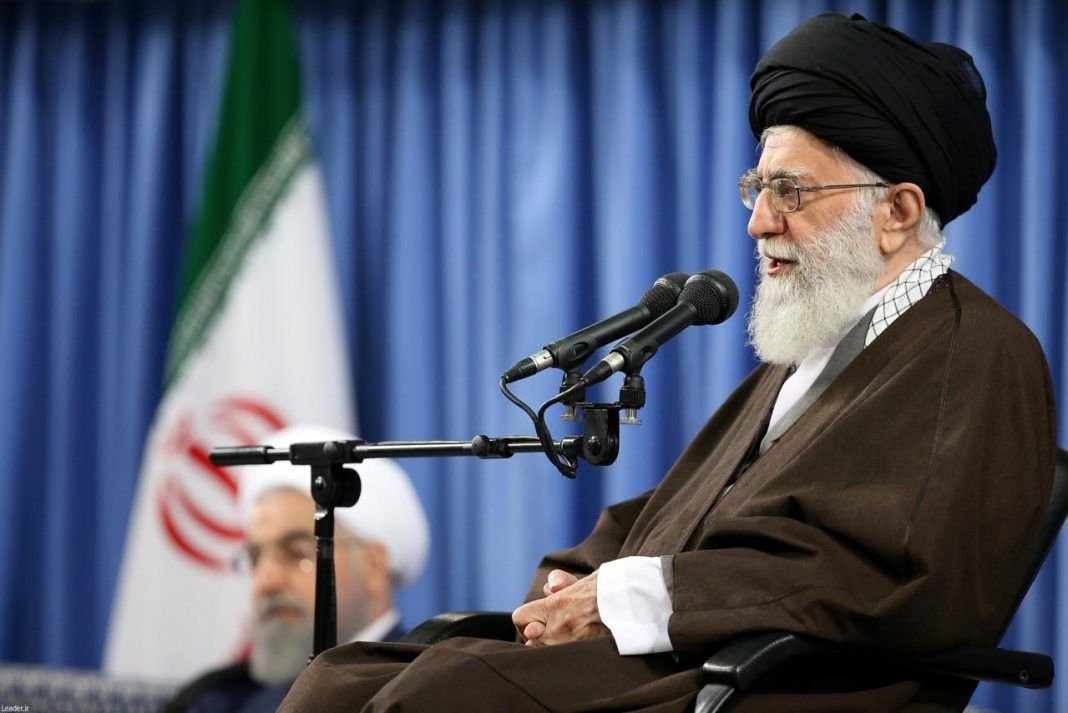By Francois Murphy and John Irish
VIENNA, May 25 (Reuters) – Iran wants European powers to present it with measures by the end of May to compensate it for the U.S. decision to abandon the 2015 nuclear deal, a senior official said on Friday, and Tehran would decide within weeks whether to quit the accord.
The 2015 agreement between Iran and world powers lifted international sanctions on Tehran. In return, Iran agreed to curbs on its nuclear programme.
[aesop_image img=”https://kayhanlife.com/wp-content/uploads/2018/04/lugarp5.jpg” panorama=”off” align=”center” lightbox=”on” caption=”Chinese Foreign Minister Wang Yi, French Foreign Minister Laurent Fabius, German Foreign Minister Frank Walter Steinmeier, European Union High Representative for Foreign Affairs and Security Policy Federica Mogherini, Iranian Foreign Minister Mohammad Javad Zarif, Head of the Iranian Atomic Energy Organization Ali Akbar Salehi, Russian Foreign Minister Sergey Lavrov, British Foreign Secretary Philip Hammon, U.S. Secretary of State John Kerry and U.S. Secretary of Energy Ernest Moniz (L to R) pose for a group picture at the United Nations building in Vienna, Austria July 14, 2015. Iran and six major world powers reached a nuclear deal on Tuesday, capping more than a decade of on-off negotiations with an agreement that could potentially transform the Middle East, and which Israel called an "historic surrender". REUTERS/Joe Klamar/Pool” captionposition=”left” revealfx=”off” overlay_revealfx=”off”]
Since President Donald Trump pulled the U.S. out last month, European states have been trying to find a way to ensure Iran still gets the economic benefits to persuade it to stay in the deal. But that has proven difficult, with European companies frightened away by U.S. sanctions.
Nations that remain in the agreement – Britain, China, France, Germany and Russia — began meetings on Friday for the first time since Trump left the pact, but diplomats see limited scope for salvaging it. Their officials will try to flesh out with Iran’s deputy foreign minister a strategy to save the deal by keeping oil and investment flowing.
“To be honest with you, we are not confident,” a senior Iranian official told reporters on Friday before the talks.
EU leaders have united behind the accord, with Brussels working on measures, including banning EU-based companies from complying with re-imposed U.S. sanctions and urging governments to make money transfers to Iran’s central bank to avoid fines.
“We expect the (economic) package to be given to us by the end of May,” the Iranian official said. “I’m sorry to say that we haven’t (seen) the Plan B yet. The Plan B has just started to be figured out.”
He said European measures would need to ensure that oil exports did not halt, and that Iran would still have access to the SWIFT international bank payments messaging system.
Washington has not only re-imposed sanctions but started to make them even tighter. U.S. Secretary of State Mike Pompeo on Monday threatened Iran with “the strongest sanctions in history” if it did not change its behaviour in the Middle East.
“Pompeo was like taking a cold shower,” said a European diplomat. “We’ll try to cling to the deal, but … we’re under no illusions.”
Iran’s supreme leader set out conditions on Wednesday for Iran to stay in the deal: unless Europe guarantees Iran’s oil sales will not be hurt, Tehran would resume enrichment of nuclear material. He also rejected any new negotiations over Iran’s missile programme, which was not covered in the nuclear deal.
The official said time was running out and that if Iran was not satisfied by European efforts, Iran would seek a ministerial meeting before making its decision.
Iran has struggled to benefit from the accord so far, partly because of remaining unilateral U.S. sanctions that have deterred major Western investors from doing business with Tehran. Some Western companies have already quit Iran or said they may have to leave because of the new U.S. sanctions.
Trump denounced the accord, completed under his predecessor, Barack Obama because it did not cover Iran’s ballistic missile programme, its role in Middle East conflicts or what happens after the deal begins to expire in 2025.
[aesop_image img=”https://kayhanlife.com/wp-content/uploads/2018/04/download.jpeg” panorama=”off” align=”center” lightbox=”on” caption=”U.S. President Donald Trump speaks as French President Emmanuel Macron looks on during their joint news conference at the White House in Washington, U.S., April 24, 2018. REUTERS/Kevin Lamarque” captionposition=”left” revealfx=”off” overlay_revealfx=”off”]
French President Emmanuel Macron wants to complement the nuclear deal with negotiations between all sides over other issues, an idea cautiously received by Russian President Vladimir Putin during talks in St. Petersburg on Thursday.
“Our position is very clear: make the JCPOA (Iran deal) a successful story, then come to us and ask for dialogue or discussion or negotiation on other subjects,” the Iranian official said.
European nations share U.S. concerns, but they say that torpedoing the nuclear deal makes them far harder, not easier, to address. They have said that as long as Tehran meets its commitments, they would remain in the deal.
The International Atomic Energy Agency, which polices the pact, said on Thursday that Iran continued to comply with its terms, but could be faster in allowing snap inspections. Its chief, Yukiya Amano, briefed participants before Friday’s meeting.
(Additional reporting by Parisa Hafezi in Ankara, editing by Peter Graff, Larry King)


